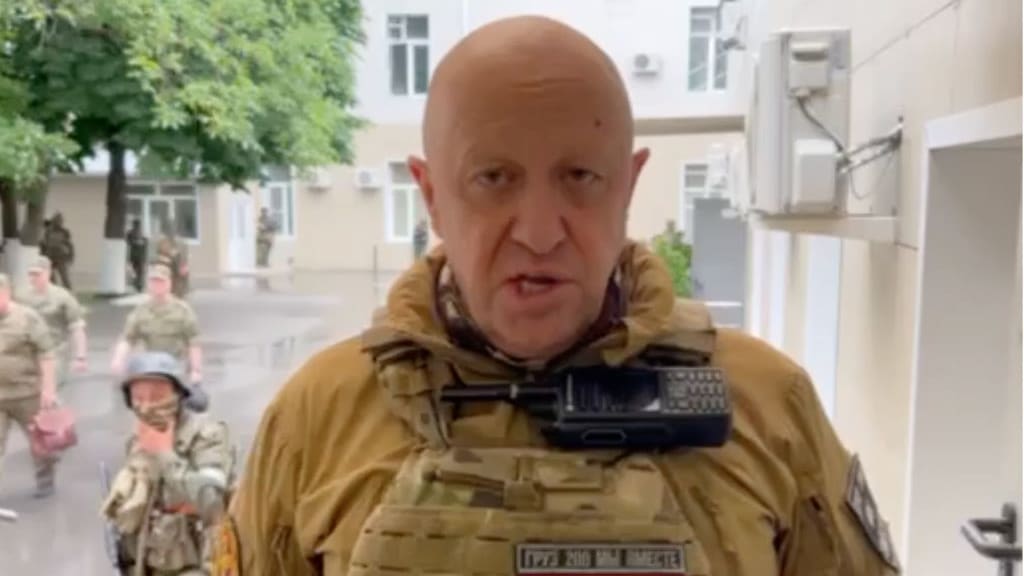The future of the Wagner Group is murky


A free daily email with the biggest news stories of the day – and the best features from TheWeek.com
You are now subscribed
Your newsletter sign-up was successful
With Yevgeny Prigozhin, the head of the Wagner Group private military company, agreeing to go into exile in Belarus, questions are swirling about what will happen to his mercenaries that have been fighting in Ukraine.
This weekend, Prigozhin accused Russian Defense Minister Sergei Shoigu of ordering airstrikes against his fighters, and led a brief revolt that saw his forces march toward Moscow and take control of the Russian city Rostov-on-Don. Tensions have been brewing for months between Prigozhin and Shoigu, especially after the defense minister announced a decree commanding "volunteer formations" like the Wagner Group sign to contracts with the Defense Ministry by July 1. Prigozhin pushed back and said he would not sign, since it would place Wagner fighters under Shoigu.
Prigozhin called on Russian citizens and military members to join Wagner, and in response, Russian President Vladimir Putin delivered a televised address on Saturday, saying any actions that "split our unity are a stab in the back of our country and our people." In a surprise turn, the Kremlin later announced that Belarusian President Alexander Lukashenko negotiated a deal where Wagner soldiers would turn around and Prigozhin would go into exile in Belarus to avoid prosecution.
The Week
Escape your echo chamber. Get the facts behind the news, plus analysis from multiple perspectives.

Sign up for The Week's Free Newsletters
From our morning news briefing to a weekly Good News Newsletter, get the best of The Week delivered directly to your inbox.
From our morning news briefing to a weekly Good News Newsletter, get the best of The Week delivered directly to your inbox.
Prigozhin has not been heard from since, and it's not clear what will happen to the Wagner Group. Wagner forces earned Russia's only land victory in months in Bakhmut, Ukraine, and as part of the negotiations, Wagner troops who did not support the revolt inside Russia will be offered contracts directly with the Russian military. Lord Richard Dannatt, former chief of the general staff of the British armed forces, told The Associated Press that "what we don't know, but will discover in the next hours and days is, how many of [Prigozhin's] fighters have gone with him, because if he has gone to Belarus and kept an effective fighting force around him, then he ... presents a threat again" to Ukraine.
Many Wagner soldiers were recruited from Russian prisons, attracted to offers of sentence reductions and cash payments, and in addition to fighting in Ukraine, Wagner mercenaries have been sent to Syria and Sudan. Wagner soldiers are also in the Central African Republic fighting rebels, with the organization being paid in mining concessions, a member of the U.N. working group on the use of mercenaries told NBC News in early June. Wagner fighters have been accused of brutality and human rights abuses, leading the U.S. to label the group a "significant transnational criminal organization."
A free daily email with the biggest news stories of the day – and the best features from TheWeek.com
Catherine Garcia has worked as a senior writer at The Week since 2014. Her writing and reporting have appeared in Entertainment Weekly, The New York Times, Wirecutter, NBC News and "The Book of Jezebel," among others. She's a graduate of the University of Redlands and the Columbia University Graduate School of Journalism.
-
 Is Andrew’s arrest the end for the monarchy?
Is Andrew’s arrest the end for the monarchy?Today's Big Question The King has distanced the Royal Family from his disgraced brother but a ‘fit of revolutionary disgust’ could still wipe them out
-
 Quiz of The Week: 14 – 20 February
Quiz of The Week: 14 – 20 FebruaryQuiz Have you been paying attention to The Week’s news?
-
 The Week Unwrapped: Do the Freemasons have too much sway in the police force?
The Week Unwrapped: Do the Freemasons have too much sway in the police force?Podcast Plus, what does the growing popularity of prediction markets mean for the future? And why are UK film and TV workers struggling?
-
 What is ‘Arctic Sentry’ and will it deter Russia and China?
What is ‘Arctic Sentry’ and will it deter Russia and China?Today’s Big Question Nato considers joint operation and intelligence sharing in Arctic region, in face of Trump’s threats to seize Greenland for ‘protection’
-
 New START: the final US-Russia nuclear treaty about to expire
New START: the final US-Russia nuclear treaty about to expireThe Explainer The last agreement between Washington and Moscow expires within weeks
-
 What would a UK deployment to Ukraine look like?
What would a UK deployment to Ukraine look like?Today's Big Question Security agreement commits British and French forces in event of ceasefire
-
 Did Trump just end the US-Europe alliance?
Did Trump just end the US-Europe alliance?Today's Big Question New US national security policy drops ‘grenade’ on Europe and should serve as ‘the mother of all wake-up calls’
-
 Is conscription the answer to Europe’s security woes?
Is conscription the answer to Europe’s security woes?Today's Big Question How best to boost troop numbers to deal with Russian threat is ‘prompting fierce and soul-searching debates’
-
 Trump peace deal: an offer Zelenskyy can’t refuse?
Trump peace deal: an offer Zelenskyy can’t refuse?Today’s Big Question ‘Unpalatable’ US plan may strengthen embattled Ukrainian president at home
-
 Vladimir Putin’s ‘nuclear tsunami’ missile
Vladimir Putin’s ‘nuclear tsunami’ missileThe Explainer Russian president has boasted that there is no way to intercept the new weapon
-
 The Baltic ‘bog belt’ plan to protect Europe from Russia
The Baltic ‘bog belt’ plan to protect Europe from RussiaUnder the Radar Reviving lost wetland on Nato’s eastern flank would fuse ‘two European priorities that increasingly compete for attention and funding: defence and climate’
